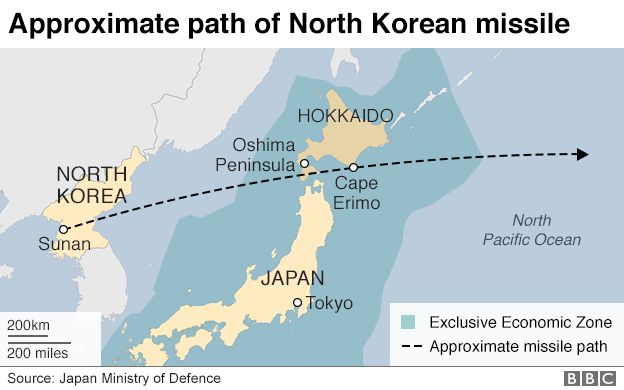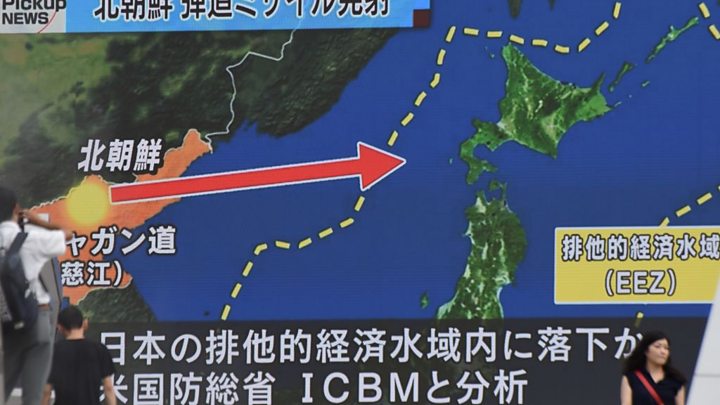US President Donald Trump has said North Korea's latest missile launch signals "contempt" for its neighbours and the UN.
He said the North would only increase its isolation and that "all options" were on the table.
The missile flew over northern Japan's Hokkaido island before crashing into the northern Pacific Ocean.
Pyongyang says it is being provoked by US-South Korea military exercises which it says are a rehearsal for invasion.
Russia and China have also cited the drills as the source of the latest tensions.
The UN Security Council is due to hold an emergency meeting in response. Ahead of the meeting, Secretary-General Antonio Guterres said the missile launch undermined regional security and stability.
He called on Pyongyang to comply with its international obligations.

President Trump, in a statement released by the White House, said the world had "received North Korea's latest message loud and clear".
"This regime has signalled its contempt for its neighbours, for all members of the United Nations, and for minimum standards of acceptable international behaviour," he said.
"Threatening and destabilising actions only increase the North Korean regime's isolation in the region and among all nations of the world. All options are on the table."
Earlier this month, President Trump warned Pyongyang would face "fire and fury" if it continued to threaten the US, while North Korea threatened to fire missiles towards the US Pacific territory of Guam.
However, North Korean UN ambassador Han Tae-Song said his country had the right to respond to the military exercises.

"Now that the US has openly declared its hostile intention towards DPR [North] Korea by raising joint aggressive military exercises despite repeated warnings... my country has every reason to respond with tough counter-measures," he told a disarmament conference in Geneva.
He said the US would be responsible for any "catastrophic consequences".
Pyongyang has conducted a flurry of missile tests recently but this is the first time it has fired what is thought to be a ballistic weapon over Japan.
On the two previous occasions its rockets crossed Japan - in 1998 and 2009 - North Korea said they were for satellite launch vehicles, and therefore not weapons.

The latest launch appears to be the first of a missile powerful enough to potentially carry a nuclear warhead, says the BBC's Rupert Wingfield-Hayes in Tokyo.
Russia's deputy foreign minister, Sergei Ryabkov, said the use of sanctions and force to resolve the situation was "a path to nowhere; a path to catastrophe".
He called on the North to halt its missile launches and on the US and its allies to avoid escalating military tension.
China also warned that tensions had reached a "tipping point" and said the US and South Korea were partly to blame.
As the missile soared over Hokkaido island, Japanese authorities issued a safety warning urging citizens to shelter in "a sturdy building or basement".
Later, four South Korean fighter jets bombed a simulated target at a firing range in a drill - a show of strength ordered by President Moon Jae-in.
US and Japanese forces recently held a joint drill in Hokkaido while another annual exercise involving tens of thousands of South Korean and US military personnel is still under way in South Korea.
Japanese Prime Minister Shinzo Abe called the missile launch an "unprecedented" threat to his country.
He said he had spoken to Mr Trump and they agreed to increase pressure on North Korea.
North Korea's conventional and nuclear weapons programmes are a breach of UN resolutions.
North Korea's missile programme:
- North Korea has been working on its missile programme for decades, with weapons based on the Soviet-developed Scud
- It has conducted short- and medium-range tests on many occasions, sometimes to mark domestic events or at times of regional tension
- In recent months the pace of testing has increased; experts say North Korea appears to be making significant advances towards its goal of building a reliable long-range nuclear-capable weapon
- In July, North Korea launched two missiles which it said were Inter-Continental Ballistic Missiles (ICBMs) capable of hitting the US; experts believe they put parts of the US in range
- There is no consensus on how close North Korea is to miniaturising a nuclear warhead to put on a missile
